School 2017 startups from Y Combinator: "Why?" (part two)
"all of the best startups that we have funded at Y Combinator, was the first idea and then he startup."
— Sam Altman

— I would like now to summarize all of the other things that are covered in the course. And since it is mostly lectures from invited guests, this is my chance to talk about their beliefs. And I would like to start with what makes Silicon valley so special. 100 people in the audience here at Stanford. There will be hundreds of thousands or millions of people around the world who will watch this video online. And when I travel around the world, talking about startups, the most popular question I'm asked is, "Why Silicon valley? What is happening there? What sets it apart from others? Why we can't do this where I come from?".
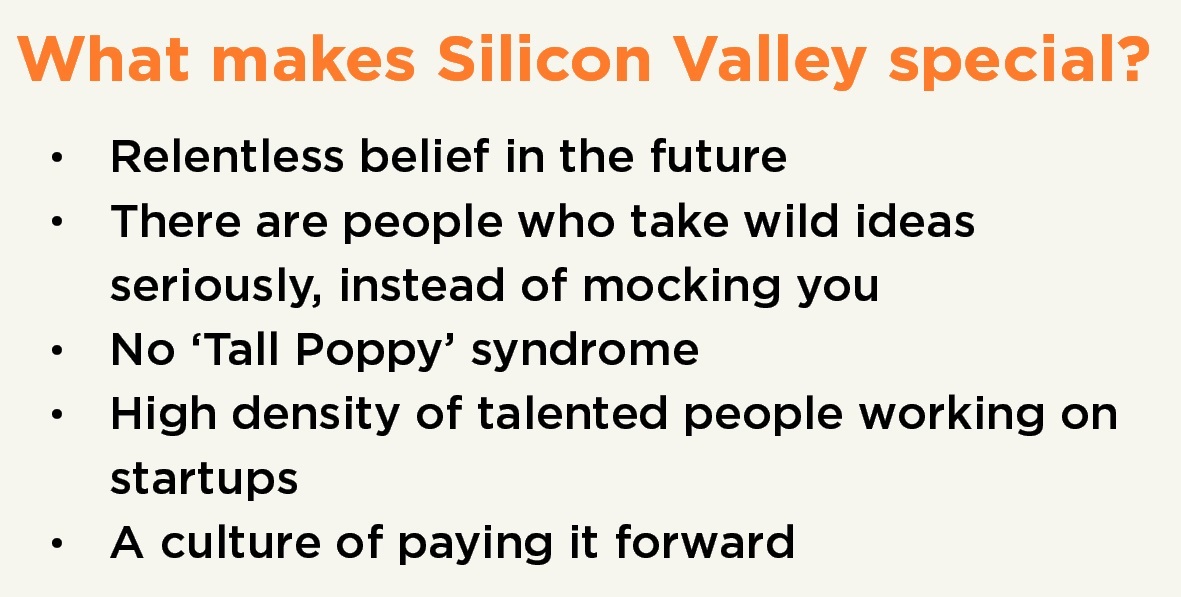
I think it is a cognitive issue, even for people living here. Because you want to know what it is and surround yourself with its most concentrated version. The most important thing, in my opinion, it is relentless faith in the future. There are people who will seriously accept your crazy idea, instead of mocking you. All because they figured out what to give up and say that every stupid idea they will be very expensive.
So if you have someone who says, "I will create a company of electric vehicles" and they don't know much about batteries, but about the machines even less, it will be easy to write off. Yesterday, Tesla held a Ford on the market. So people figured out that these wild ideas about the future you don't want to write off so quickly. You want to give them a chance. You want to think about them. In many parts of the world and in the context of other professions over you will just mock you behind your back or staring you right in the face, whatever.
do You really want to find a small number of people in your life who will support your ambitions and not to belittle them.
And it is hard to find. It's not something that comes by default. We are not aware of how rare the case that we are in an environment where most people are just like that. It is not the tendency to criticize successful people. In many other countries, many other cultures have a word for when a person becomes too successful, too ambitious, too global-minded, and you have them pokupaete. But in America, even this phrase, and in many other cultures there.
There is also a high ratio of people working on startups here and the culture that they are willing to pay for it. People helped me with my startup, I will help them with their startup. And you want to surround yourself with that attitude regardless of where you're from. You may find that you need to find a community online. You still want to do it. Oh, it's my old version of the slides. I sent you a new one? Okay, let's stick to that.
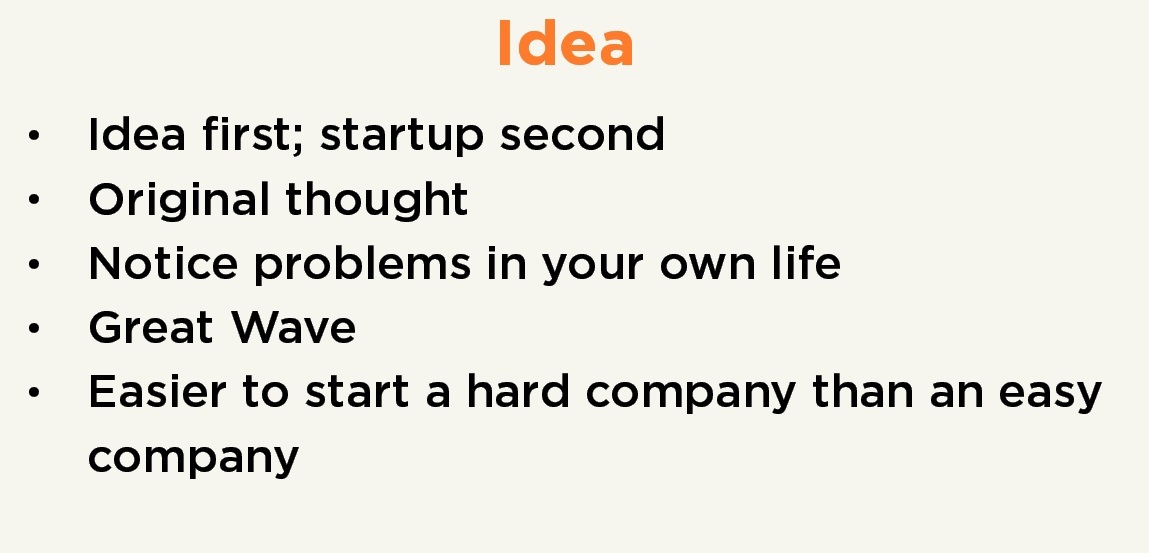
One of the things that must be considered right at startup is the idea. Silicon valley has developed a myth that the idea is not important. You have to create a startup to push its way out at random and hope that you will do something big. But as said Dustin, all the best startups that we have funded at Y Combinator, it was primarily the idea and, then, itself a startup, it was not the number of pivots. Very few pivots have been successful and then only in the case when the creators in the process found out that there is some other idea that they lit up more than the original. Or they found some new problem. The original idea is very difficult to reproduce, but it's really important. The most successful startups were not derivative. They are not copying something that worked well. Many people are trying to create a copy of what worked well last year. I don't know how many people have created a clone of Facebook a year later after Facebook appeared. Should be a lot.
Lot.
— A lot, and not one of them has become something significant. Next never Facebook looks like Facebook, it looks like something completely different. And in order to succeed you need to start to notice problems in their own lives. And the big advantage that you have, as students, is that students, in General, all young people are usually aware of cutting edge technologies. You can predict the next boom before it happens. And this idea of boom, I believe, is the most important concept of identifying good ideas.
People wonder why start-UPS are formed in such small periods of time. Why was the number of startups was a company that was created in the late ' 90s, early 2000 and they were very successful? Why was the number of startups that were created between 2009 and 2011 and they were very successful? And the reason for the hype, Internet and mobile phone in these two cases, smartphones. Suddenly things become possible that were previously impossible. And when that happens, due to the fact that startups can grow quickly, you can do things at a different outcome would not have been possible or would have won a large company, if things had been different. And you want to think about what will be the next boom.
My personal guess is that this will be machine learning applicable to each of the vertical. I think this is the easiest way at the moment, if you want to create a company. But you probably know what it is much better than I do. What would your peers were doing whatever they liked, even if it looks like a toy, especially if it looks like a toy today, it's likely the next boom. But you want to define it. What a great technological tectonic shift will happen in the next couple of years? Do something that is going to involve, and build on this platform. It's easier to create difficult company than easy.
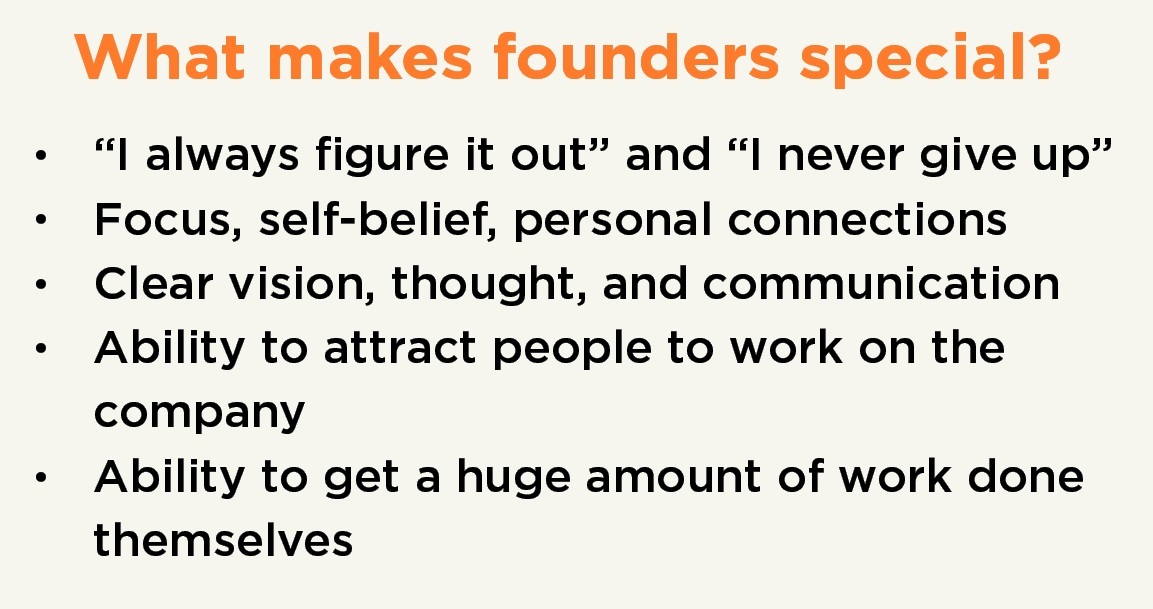
Most people, especially young people, want to choose something that doesn't sound too grandiose, doesn't sound too difficult. Because they believe that the creation of the company sounds like something very difficult. I would rather choose the easiest company possible. But really founding a company is hard, you will be equally difficult regardless of what you do. Although if you are creating a difficult company if you inspire passionate people, if you are building a General artificial intelligence or supersonic aircraft or nuclear energy, you will be much more interested in people than, for example, in derivatives the idea of Facebook 1952. This idea that it's easier to create difficult company than easy, I think it's still a big secret in startups. But this is an idea that works, and I see it over and over again.
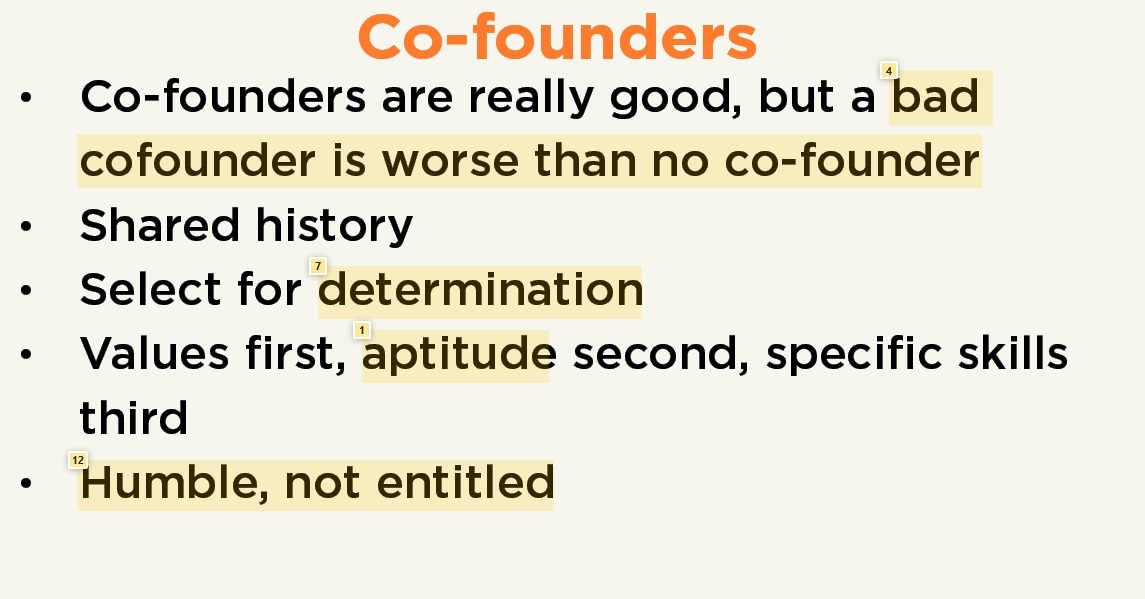
As mentioned by Dustin, answering the question of the co-founders is very good. But a bad co-founder is far worse than his absence. Because of the fact that so many people say that you need a co-founder, there are people who will take a random person off the street and make him my co-founder. This is very bad. In fact, we did some analysis of the data in Y Combinator and found that these random co-founders always bring 100% failure, 100%.
You need a common shared history. You want someone who is good at his job as you know that you know what can work and with which needs. Many times in the course of a startup's expected valuation line falls below the x-axis. Temporarily. And now it is irrational to continue. But if you have a joint history and a connection with someone, you continue anyway because you don't want to fail her friend. This is very important. You want to choose for the purpose.
You want someone with great potential and aptitude. And then you think about specific skills. You want someone humble and nezadolgo. Someone asked Dustin about what had changed in start-UPS from 2004 to 2017. My answer to this question lies in the fact that now more people than ever before want to do startups for the wrong reasons. They want to do it because it's cool. Such people would go to investment banking in 2004. You want modest and nazanskiy people who are willing to do whatever is necessary. And they do it because they want to create this thing. They have the idea that they can't let go. In this course, we have five lectures devoted to the product since all you have to do it a wonderful product.
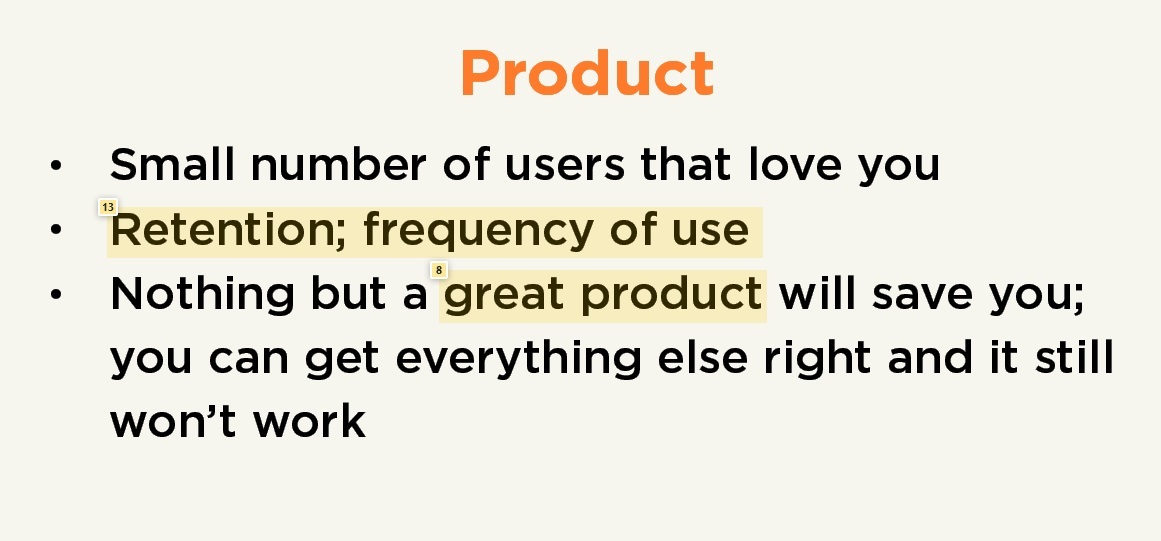
The only thing I want to mention is that you need to consider when you think about the product you want to build. Much more important to have a small number of users who love you than a lot of people you just like. And almost all startups don't understand it. In the end, of course, you want to have lots of users who really love your project. But it is almost impossible to achieve. In practice you have two choices. You can go deeper into a narrow field and have a small number of users who will love you. And then you can figure out how to attract more and more users and expand the use of the product. Or maybe a lot of people who used your product once or twice, they kind of liked and you try to figure out how to attract them again with time.
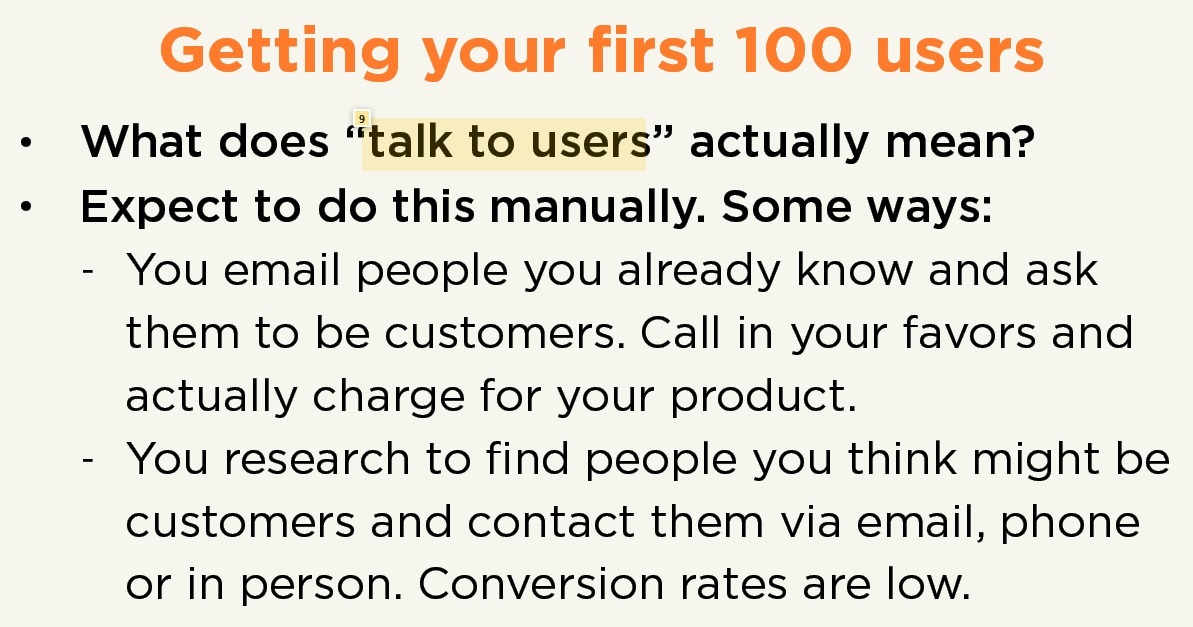
With great confidence I can say that you want to start with a small amount of users who really love you. Almost all great companies have products that were created that way. Think about those that you use in life, about the products that are so good that you don't hesitate to tell his friends about them. The products are so good that if they were closed, you would write the company a complaint. That's what it means to really love the product.
A good indicator of this is the storage and frequency of use. In fact, I think it is important to understand that you don't have to monitor the growth and number of users in the early stages of a startup. You just have to keep track of how often they use it, we'll have a lesson on the scorecards later. You need to learn how to qualitatively analyze their metrics and say to myself, "This is the person I will save, and that uses my product often? How do I compare it with other products in this area?". This is a very good early indicator of users who love you. But still better if they did not hesitate to suggest your friends to buy your product. But the main idea is not that. Nothing but a great product won't save you.
We will be talking about many other different things in this course and they are all important. But if you don't have it, if you don't do a wonderful product, it won't work. You need multiple users to create a truly wonderful product. You can't do this in a vacuum. You need people with whom you can talk and over which to iterate. You need to find a small number of users, which will help you to build this wonderful product.
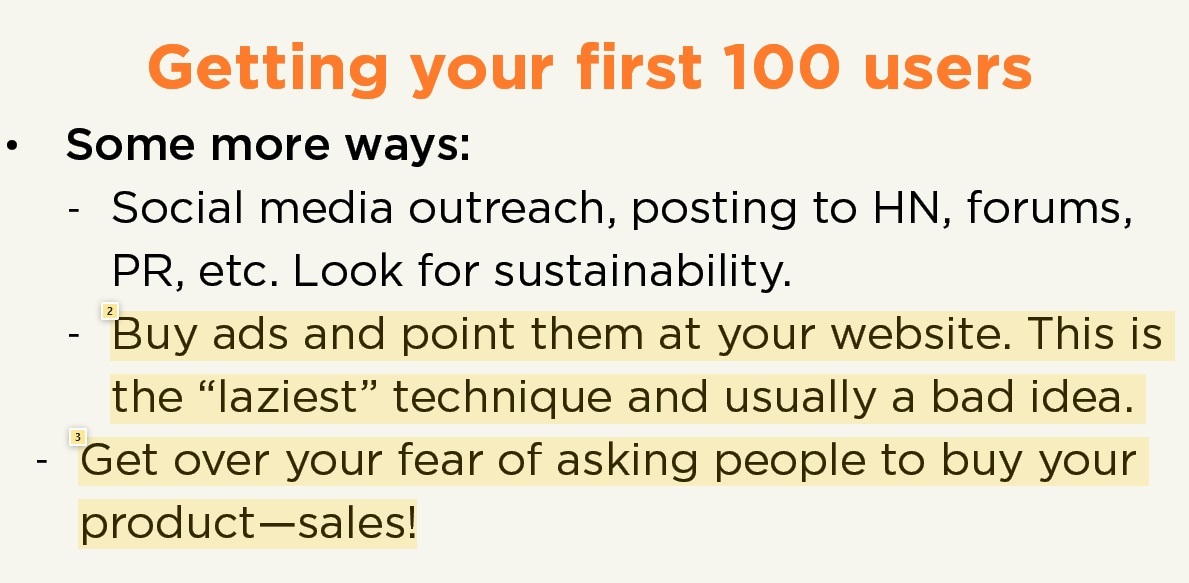
And one of the most common clichés in all startup advice is to talk with your users. I learned that not all people understand what it means. Most people will say "Oh, I got to talk with their users," and they call its user and say "hi, this is Sam, do you like my product?". And the user says, "Yes, I like it good". People usually don't want to upset you. And you say "Oh, OK" and hang up. That's what most founders, when I suggest to communicate with users. That's not what I mean.
Emmett shear, who would later be one of the speakers, very good interviews and I will tell you later about this in detail. But you need to get to the bottom. And remember, people with you are too cute. You need to find out what they like. You need to see how they use it. You need to try to figure out whether they are doing something that seems odd, because they are trying to achieve something else? You should ask them if they recommend your product to anyone else? If not, why not? You already paid me? If not, why not? What do I need? You need to get to the truth and to talk about special features, the things used as something else. You need to talk about the times that they stopped using your product and started to use some other product. Questions upper level you will not help. As for users, still think that they will launch a site will tell a couple of people and things will go uphill. But that's not what usually happens.
There are four basic strategies that will help you win the first hundred users. I'll go through them starting from the best and ending the worst. You can email the people you know and ask them to be your buyers. You can offer them all the favors that come to mind. You can offer to someone who took some kind of course, someone from whom friends at school. If it is a paid product, you need to go on the attack. This is important, remember, people will tend to fulfill your requests, and they will be too nice in conversation with you. So if it is a paid product, ask them to be your customers.
Another strategy is to explore people that you think will use your product and then write to them and ask them to try it. Conversion rates are low, approximately 2%, 3%. So you will need to do it with lots of people. But you can send letters and say, "Hey, I just made a new product, it would be great if you tested it". Most people want to be helpful. And probably will be. You can use social media, Hacker News, forums, press, anything. If this is your growth strategy, you need to figure out a way to make it long lasting, it doesn't have to be just one big blast that all will quickly be forgotten. Most people who do so, understand that it worked once, and they call the journalist and say "Hey, would you write about me again?". And the journalist asks:
— Has anything changed?
— No, but I really need users, please write to me.
The journalist continues to say "no".
Air BnB is an example of a company that has achieved success through continuous process. They were doing crazy things. They had one bold public statement after another. They sent reporters a huge box of oatmeal, only they would have again had the opportunity to sit behind a Desk. And the mind was able to make this a continuous process. But it's hard.
Finally, the laziest and least impressive thing we can do is just buy advertising on Facebook or Google and to send people to your website. I don't recommend to do it. I don't know of startups that are started well in this way. I have included it in the list because it is the idea that trying to follow many people. I want to conclude my speech by talking about building a great company, before I answer a few questions.
We've talked about this before. Get to know your users is extremely important. The best founders are engaged in customer support, they were visited by their users. They were sitting in their office if I could. In the case of AirBnB, they lived with them. You want very good to know its users. They have a short cyclic plan. The cycle is like this: talk to client to understand pain point, to build a product that appeals to it, set it in front of the user, to ask him to see what he will with the product to do and then repeat the cycle. This cycle is about how to iterate and improve their business. The law of compound growth, that is, if you can make your product 2% better after each iteration of the loop, and you have the chance to use the loop iterations every four hours or every four weeks, and you do this after the course for several years, you all will be in different places.
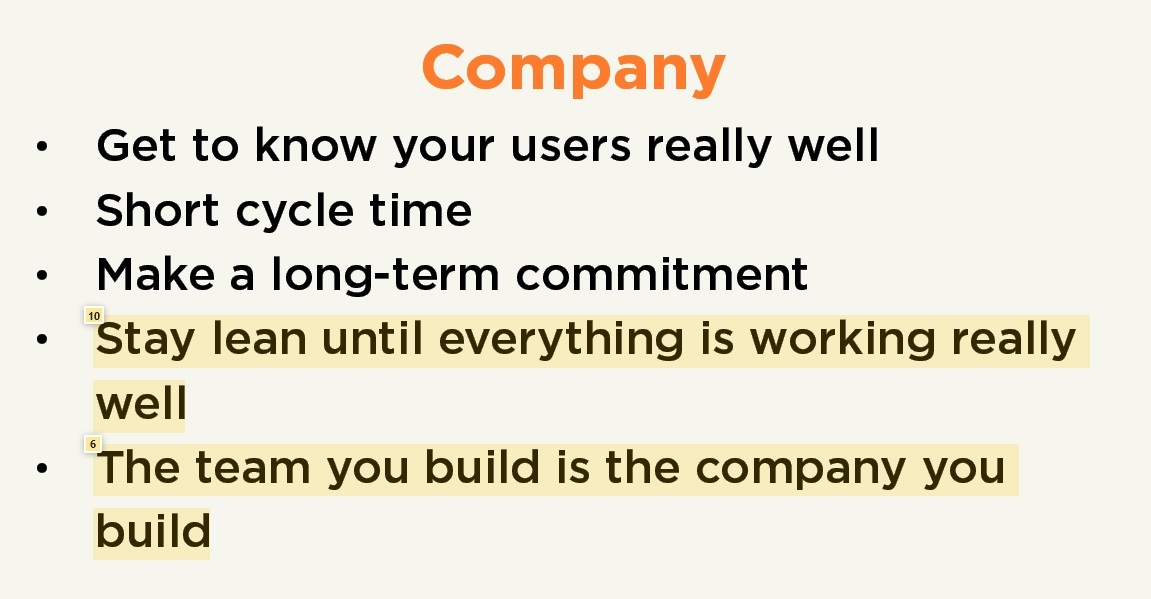
Make one of its main goals building the fastest company to carry out the iteration, which the world has ever seen. You want to have a long-term commitment. Most companies do not, most companies, especially if they are trying to create a light company, I think within two or three years. Such things always require much more time, somehow it's almost always a 10-year project if it is successful. And if you think that to begin with, you will take a completely different and much more correct decisions.
I think arbitration is the only possibility that remained on the market. Almost nobody makes long-term commitments to his new project. But if you do, you will think differently. You hire other people and achieve success. Speaking of hiring, thank goodness for small mercies as long as things don't go to the mountain. I think this is somewhat bimodal. In the early stages when you are experimenting and moving in zigzags, you want to be like a fast little boat, and you want to be able to dramatically change the entire company. You can't do that if you have a big company.
The money spent on the side and that's another problem. The wide scope of the company mainly decrease with the square of the number of employees. So you want to stay a very small company until then, until you are confident that things are going uphill. As soon as things go uphill, you can become a very large company. And you really need to become such a company. As soon as you switch in a large-scale mode, you want to become a very large company as quickly as possible and with wonderful people on Board. Because now you don't want to be a boat, you want to be a carrier, you want to be a battleship. And you do not care about that you can't turn as quickly as before. You just want to roll up all in asphalt. You want to be in either one mode or the other, and you will understand.
In a time when people are literally begging you to give them your product and in that moment, when you are sure that you have a great product that adapts to the market, then you can expand your company. When you reach this stage, beware of the temptation to hire mediocre people.
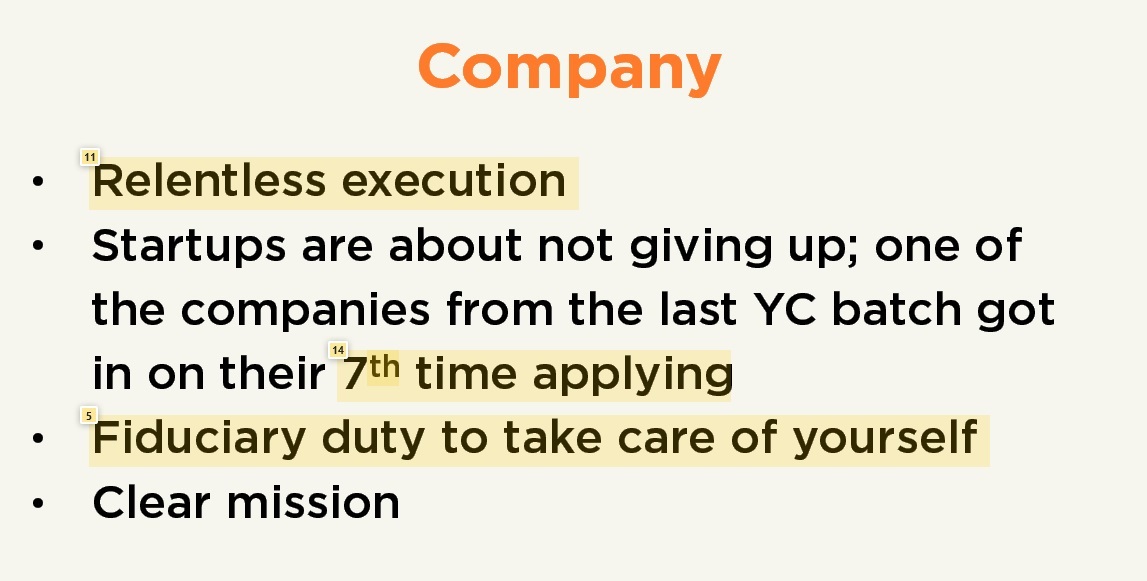
From Lynette Holy, which will be too late to speak here on the course, there is a saying which I love. It sounds like this: "team that you build is the company you build". It is, in fact, true. I didn't realize it for a very long time. If you build a team of great people, and you will have a product that people love, you will have greater than 90% chance of success. Both very difficult to do, and it's independent variables, but do not ignore the paragraph about the team.
The main best Executive Directors I know spend a huge amount of time for the recruitment and retention of their talent. Tell me, how much of your time did you spend on this?
— Approximately 40-50%.
40-50% off! Is Dustin moskovitz, he didn't need to do anything that he doesn't want to do, and he decides to spend half his time on recruitment and retention of staff members. If Dustin can do it, you probably also need to do so. Every CEO I've ever met, there is justification as to why they spent only 5% of their time on team building. It is always a very good reason, but always these companies tend to fail. Invest money in it. Continually running. This is a topic about which we will speak a lot. But you need not stop and continue to move forward. And we need to do everything perfectly. And you need to properly consider all the details. You need to very carefully treat every experience the client has with your company.
There is a book "The Score Takes Care of Itself", read it. She's very good. It's about how it is important to consider all the details and just steadily move forward as quickly as you can. Startups that do not give up in the extent to which most people are not good intuitive understanding. One of the best companies in YC group, he had applied seven times before it took. Most people if you denied them six times, will not come to you in the seventh. This is what happens in start-UPS constantly, you will be knock down again and again and again. It's like last time when you pushed, you think you have no strength to climb... And then you suddenly succeed. This is what you sign when you create a startup. Remember that if this 10-year marathon, you have a responsibility to your Trustees to take care of themselves. Some people sit at the startup night. They are not well concerned about their health. They do not sleep. They do not maintain a personal relationship.
It's true, startups are a bad choice for a balance between work and life. There are always posts on how I changed the world with his startup, working only 2 hours a day and dealing with the kite remaining time. Somehow, these people are not always those who have a big impact. They just talk a lot. Startups is very difficult. You have a responsibility to ourselves, to the team, to investors to take care of themselves and not neglect their health, their well-being and all the rest... your life, Your personal relationships. And then just work. You don't have to understand everything the first day. But most of the successful startups in which I was lucky enough to have done it pretty quickly... In the first year or first two years they determine for themselves the main task. It is the task of forcing you to join them in this task motivates them, motivates the founders.
The media writes about them. And even if you start with a project that you simply interesting and solves the problems in your life, you have to start that way. Remember that at some point, you should have a clear goal. You must become a great Evangelist for the mission. Another skill that is not rendered in this version of the slides is that you must be an excellent conversationalist. You have available to convey information to other people, to think clearly, it is your clear objective. That's what will convince people to help you. So you will adjust your idea to fit a huge list of features. This is a huge company and all those people who love your product. Okay. It took me more time than I expected. I've got about two minutes to answer questions if you have them.
I was always wondering. If you have two people you can hire. One very passionately interested in what you create, but lacks the necessary skills. Another very good doing what you are strong, but not so much interested in your idea. Whom should you choose?
And so, you need to choose who to hire. One very passionate about your idea and valuable, but not suitable due to the lack of good skills. The other has excellent skills, but not particularly interested in your idea. Take into consideration the value the employee, then the aptitude and then certain skills. If you can get a pretty clever employee who shares your views and what your goal is and believe in what you are doing, what skills he can learn. It is a truth that has never failed me.
— How to learn to come up with good ideas?
— How to learn to come up with good ideas? First, a lot of practice and to tell people about your ideas. And be prepared that they will say that your idea is terrible. I think that is a good idea not solo work. You want to find a group of smart people that you will be able to throw thoughts and say, "Hey, I noticed that it was awful. What we can do about it?". You don't just sit there in the room and do not write a white marker on the window ideas that came to mind.
Good ideas because you interact with people.
You have smart friends and colleagues, and you solve the problem together, thinking of ideas. I would say, notice the problems in life, even if you have no solution, just negotiate the problem and try to come up with something. One more thing. Ideas are very fragile. When you find that a certain group of people with whom you can discuss ideas, you want people who don't immediately criticize raw, nesformirovannost idea. You want people who will tell you: "Well, Yes...But what if we try to do something different". You don't want people who will tell you: "It sounds stupid". You want people who will tell you: "It sounds crazy and unlikely to work, but imagine how it will make a splash, if you still work." You need someone with that mindset. And then we can figure out how to implement what you want? I'd say ignore the problem, get your people we will be able to discuss them. Do you have anything to add? Okay, moving on. One more question.
— It revolves around fundraising. How do you know it's time to start fundraising?
— How to understand that the time has come to start collecting funds? We will have an entire class devoted to it. But in General, if you can collect the money and it's easy...If people desperately want to give you money on good terms, it might be a good time to take them. The other question of course is whether you need the money? When you need money, you have to take them regardless of the conditions that you offer. In General, you want to have a progress which would justify the funding that you need. When you have enough progress and you need money because you can easily raise the money at this point, it is the best time to start fundraising. But again, this is a complex issue. We'll have a whole lecture on it. Okay, one more.
— How do you decide when to switch from search mode to switch to the risk?
— How to decide when to switch from the state when you just mess around trying to get an excellent product that would hold in the market in a condition where you really expand? You'll understand. Everyone is always wondering how to understand that this is the right moment. If you run in the office 80 hours a week, tearing their hair, and people love your product so much that you can't make it fast enough, it that very moment. I've never met anyone who wouldn't understand at this moment. Well. On Thursday we will have a session on the financial mechanics of a startup.
And thank you very much.

Translation: Diana Eremeeva
Continued
the
Full video:
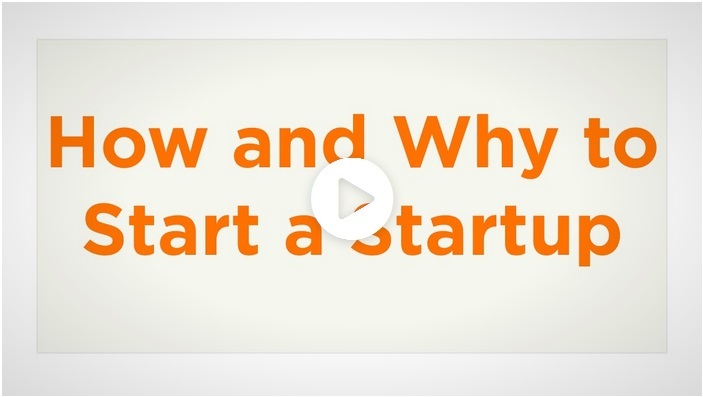
Left new video. Who wants to help with translation — write.
Article based on information from habrahabr.ru
— Sam Altman

— I would like now to summarize all of the other things that are covered in the course. And since it is mostly lectures from invited guests, this is my chance to talk about their beliefs. And I would like to start with what makes Silicon valley so special. 100 people in the audience here at Stanford. There will be hundreds of thousands or millions of people around the world who will watch this video online. And when I travel around the world, talking about startups, the most popular question I'm asked is, "Why Silicon valley? What is happening there? What sets it apart from others? Why we can't do this where I come from?".

I think it is a cognitive issue, even for people living here. Because you want to know what it is and surround yourself with its most concentrated version. The most important thing, in my opinion, it is relentless faith in the future. There are people who will seriously accept your crazy idea, instead of mocking you. All because they figured out what to give up and say that every stupid idea they will be very expensive.
So if you have someone who says, "I will create a company of electric vehicles" and they don't know much about batteries, but about the machines even less, it will be easy to write off. Yesterday, Tesla held a Ford on the market. So people figured out that these wild ideas about the future you don't want to write off so quickly. You want to give them a chance. You want to think about them. In many parts of the world and in the context of other professions over you will just mock you behind your back or staring you right in the face, whatever.
do You really want to find a small number of people in your life who will support your ambitions and not to belittle them.
And it is hard to find. It's not something that comes by default. We are not aware of how rare the case that we are in an environment where most people are just like that. It is not the tendency to criticize successful people. In many other countries, many other cultures have a word for when a person becomes too successful, too ambitious, too global-minded, and you have them pokupaete. But in America, even this phrase, and in many other cultures there.
There is also a high ratio of people working on startups here and the culture that they are willing to pay for it. People helped me with my startup, I will help them with their startup. And you want to surround yourself with that attitude regardless of where you're from. You may find that you need to find a community online. You still want to do it. Oh, it's my old version of the slides. I sent you a new one? Okay, let's stick to that.

One of the things that must be considered right at startup is the idea. Silicon valley has developed a myth that the idea is not important. You have to create a startup to push its way out at random and hope that you will do something big. But as said Dustin, all the best startups that we have funded at Y Combinator, it was primarily the idea and, then, itself a startup, it was not the number of pivots. Very few pivots have been successful and then only in the case when the creators in the process found out that there is some other idea that they lit up more than the original. Or they found some new problem. The original idea is very difficult to reproduce, but it's really important. The most successful startups were not derivative. They are not copying something that worked well. Many people are trying to create a copy of what worked well last year. I don't know how many people have created a clone of Facebook a year later after Facebook appeared. Should be a lot.
Lot.
— A lot, and not one of them has become something significant. Next never Facebook looks like Facebook, it looks like something completely different. And in order to succeed you need to start to notice problems in their own lives. And the big advantage that you have, as students, is that students, in General, all young people are usually aware of cutting edge technologies. You can predict the next boom before it happens. And this idea of boom, I believe, is the most important concept of identifying good ideas.
People wonder why start-UPS are formed in such small periods of time. Why was the number of startups was a company that was created in the late ' 90s, early 2000 and they were very successful? Why was the number of startups that were created between 2009 and 2011 and they were very successful? And the reason for the hype, Internet and mobile phone in these two cases, smartphones. Suddenly things become possible that were previously impossible. And when that happens, due to the fact that startups can grow quickly, you can do things at a different outcome would not have been possible or would have won a large company, if things had been different. And you want to think about what will be the next boom.
My personal guess is that this will be machine learning applicable to each of the vertical. I think this is the easiest way at the moment, if you want to create a company. But you probably know what it is much better than I do. What would your peers were doing whatever they liked, even if it looks like a toy, especially if it looks like a toy today, it's likely the next boom. But you want to define it. What a great technological tectonic shift will happen in the next couple of years? Do something that is going to involve, and build on this platform. It's easier to create difficult company than easy.

Most people, especially young people, want to choose something that doesn't sound too grandiose, doesn't sound too difficult. Because they believe that the creation of the company sounds like something very difficult. I would rather choose the easiest company possible. But really founding a company is hard, you will be equally difficult regardless of what you do. Although if you are creating a difficult company if you inspire passionate people, if you are building a General artificial intelligence or supersonic aircraft or nuclear energy, you will be much more interested in people than, for example, in derivatives the idea of Facebook 1952. This idea that it's easier to create difficult company than easy, I think it's still a big secret in startups. But this is an idea that works, and I see it over and over again.

As mentioned by Dustin, answering the question of the co-founders is very good. But a bad co-founder is far worse than his absence. Because of the fact that so many people say that you need a co-founder, there are people who will take a random person off the street and make him my co-founder. This is very bad. In fact, we did some analysis of the data in Y Combinator and found that these random co-founders always bring 100% failure, 100%.
You need a common shared history. You want someone who is good at his job as you know that you know what can work and with which needs. Many times in the course of a startup's expected valuation line falls below the x-axis. Temporarily. And now it is irrational to continue. But if you have a joint history and a connection with someone, you continue anyway because you don't want to fail her friend. This is very important. You want to choose for the purpose.
You want someone with great potential and aptitude. And then you think about specific skills. You want someone humble and nezadolgo. Someone asked Dustin about what had changed in start-UPS from 2004 to 2017. My answer to this question lies in the fact that now more people than ever before want to do startups for the wrong reasons. They want to do it because it's cool. Such people would go to investment banking in 2004. You want modest and nazanskiy people who are willing to do whatever is necessary. And they do it because they want to create this thing. They have the idea that they can't let go. In this course, we have five lectures devoted to the product since all you have to do it a wonderful product.

The only thing I want to mention is that you need to consider when you think about the product you want to build. Much more important to have a small number of users who love you than a lot of people you just like. And almost all startups don't understand it. In the end, of course, you want to have lots of users who really love your project. But it is almost impossible to achieve. In practice you have two choices. You can go deeper into a narrow field and have a small number of users who will love you. And then you can figure out how to attract more and more users and expand the use of the product. Or maybe a lot of people who used your product once or twice, they kind of liked and you try to figure out how to attract them again with time.

With great confidence I can say that you want to start with a small amount of users who really love you. Almost all great companies have products that were created that way. Think about those that you use in life, about the products that are so good that you don't hesitate to tell his friends about them. The products are so good that if they were closed, you would write the company a complaint. That's what it means to really love the product.
A good indicator of this is the storage and frequency of use. In fact, I think it is important to understand that you don't have to monitor the growth and number of users in the early stages of a startup. You just have to keep track of how often they use it, we'll have a lesson on the scorecards later. You need to learn how to qualitatively analyze their metrics and say to myself, "This is the person I will save, and that uses my product often? How do I compare it with other products in this area?". This is a very good early indicator of users who love you. But still better if they did not hesitate to suggest your friends to buy your product. But the main idea is not that. Nothing but a great product won't save you.
We will be talking about many other different things in this course and they are all important. But if you don't have it, if you don't do a wonderful product, it won't work. You need multiple users to create a truly wonderful product. You can't do this in a vacuum. You need people with whom you can talk and over which to iterate. You need to find a small number of users, which will help you to build this wonderful product.

And one of the most common clichés in all startup advice is to talk with your users. I learned that not all people understand what it means. Most people will say "Oh, I got to talk with their users," and they call its user and say "hi, this is Sam, do you like my product?". And the user says, "Yes, I like it good". People usually don't want to upset you. And you say "Oh, OK" and hang up. That's what most founders, when I suggest to communicate with users. That's not what I mean.
Emmett shear, who would later be one of the speakers, very good interviews and I will tell you later about this in detail. But you need to get to the bottom. And remember, people with you are too cute. You need to find out what they like. You need to see how they use it. You need to try to figure out whether they are doing something that seems odd, because they are trying to achieve something else? You should ask them if they recommend your product to anyone else? If not, why not? You already paid me? If not, why not? What do I need? You need to get to the truth and to talk about special features, the things used as something else. You need to talk about the times that they stopped using your product and started to use some other product. Questions upper level you will not help. As for users, still think that they will launch a site will tell a couple of people and things will go uphill. But that's not what usually happens.
There are four basic strategies that will help you win the first hundred users. I'll go through them starting from the best and ending the worst. You can email the people you know and ask them to be your buyers. You can offer them all the favors that come to mind. You can offer to someone who took some kind of course, someone from whom friends at school. If it is a paid product, you need to go on the attack. This is important, remember, people will tend to fulfill your requests, and they will be too nice in conversation with you. So if it is a paid product, ask them to be your customers.
Another strategy is to explore people that you think will use your product and then write to them and ask them to try it. Conversion rates are low, approximately 2%, 3%. So you will need to do it with lots of people. But you can send letters and say, "Hey, I just made a new product, it would be great if you tested it". Most people want to be helpful. And probably will be. You can use social media, Hacker News, forums, press, anything. If this is your growth strategy, you need to figure out a way to make it long lasting, it doesn't have to be just one big blast that all will quickly be forgotten. Most people who do so, understand that it worked once, and they call the journalist and say "Hey, would you write about me again?". And the journalist asks:
— Has anything changed?
— No, but I really need users, please write to me.
The journalist continues to say "no".
Air BnB is an example of a company that has achieved success through continuous process. They were doing crazy things. They had one bold public statement after another. They sent reporters a huge box of oatmeal, only they would have again had the opportunity to sit behind a Desk. And the mind was able to make this a continuous process. But it's hard.
Finally, the laziest and least impressive thing we can do is just buy advertising on Facebook or Google and to send people to your website. I don't recommend to do it. I don't know of startups that are started well in this way. I have included it in the list because it is the idea that trying to follow many people. I want to conclude my speech by talking about building a great company, before I answer a few questions.
We've talked about this before. Get to know your users is extremely important. The best founders are engaged in customer support, they were visited by their users. They were sitting in their office if I could. In the case of AirBnB, they lived with them. You want very good to know its users. They have a short cyclic plan. The cycle is like this: talk to client to understand pain point, to build a product that appeals to it, set it in front of the user, to ask him to see what he will with the product to do and then repeat the cycle. This cycle is about how to iterate and improve their business. The law of compound growth, that is, if you can make your product 2% better after each iteration of the loop, and you have the chance to use the loop iterations every four hours or every four weeks, and you do this after the course for several years, you all will be in different places.

Make one of its main goals building the fastest company to carry out the iteration, which the world has ever seen. You want to have a long-term commitment. Most companies do not, most companies, especially if they are trying to create a light company, I think within two or three years. Such things always require much more time, somehow it's almost always a 10-year project if it is successful. And if you think that to begin with, you will take a completely different and much more correct decisions.
I think arbitration is the only possibility that remained on the market. Almost nobody makes long-term commitments to his new project. But if you do, you will think differently. You hire other people and achieve success. Speaking of hiring, thank goodness for small mercies as long as things don't go to the mountain. I think this is somewhat bimodal. In the early stages when you are experimenting and moving in zigzags, you want to be like a fast little boat, and you want to be able to dramatically change the entire company. You can't do that if you have a big company.
The money spent on the side and that's another problem. The wide scope of the company mainly decrease with the square of the number of employees. So you want to stay a very small company until then, until you are confident that things are going uphill. As soon as things go uphill, you can become a very large company. And you really need to become such a company. As soon as you switch in a large-scale mode, you want to become a very large company as quickly as possible and with wonderful people on Board. Because now you don't want to be a boat, you want to be a carrier, you want to be a battleship. And you do not care about that you can't turn as quickly as before. You just want to roll up all in asphalt. You want to be in either one mode or the other, and you will understand.
In a time when people are literally begging you to give them your product and in that moment, when you are sure that you have a great product that adapts to the market, then you can expand your company. When you reach this stage, beware of the temptation to hire mediocre people.

From Lynette Holy, which will be too late to speak here on the course, there is a saying which I love. It sounds like this: "team that you build is the company you build". It is, in fact, true. I didn't realize it for a very long time. If you build a team of great people, and you will have a product that people love, you will have greater than 90% chance of success. Both very difficult to do, and it's independent variables, but do not ignore the paragraph about the team.
The main best Executive Directors I know spend a huge amount of time for the recruitment and retention of their talent. Tell me, how much of your time did you spend on this?
— Approximately 40-50%.
40-50% off! Is Dustin moskovitz, he didn't need to do anything that he doesn't want to do, and he decides to spend half his time on recruitment and retention of staff members. If Dustin can do it, you probably also need to do so. Every CEO I've ever met, there is justification as to why they spent only 5% of their time on team building. It is always a very good reason, but always these companies tend to fail. Invest money in it. Continually running. This is a topic about which we will speak a lot. But you need not stop and continue to move forward. And we need to do everything perfectly. And you need to properly consider all the details. You need to very carefully treat every experience the client has with your company.
There is a book "The Score Takes Care of Itself", read it. She's very good. It's about how it is important to consider all the details and just steadily move forward as quickly as you can. Startups that do not give up in the extent to which most people are not good intuitive understanding. One of the best companies in YC group, he had applied seven times before it took. Most people if you denied them six times, will not come to you in the seventh. This is what happens in start-UPS constantly, you will be knock down again and again and again. It's like last time when you pushed, you think you have no strength to climb... And then you suddenly succeed. This is what you sign when you create a startup. Remember that if this 10-year marathon, you have a responsibility to your Trustees to take care of themselves. Some people sit at the startup night. They are not well concerned about their health. They do not sleep. They do not maintain a personal relationship.
It's true, startups are a bad choice for a balance between work and life. There are always posts on how I changed the world with his startup, working only 2 hours a day and dealing with the kite remaining time. Somehow, these people are not always those who have a big impact. They just talk a lot. Startups is very difficult. You have a responsibility to ourselves, to the team, to investors to take care of themselves and not neglect their health, their well-being and all the rest... your life, Your personal relationships. And then just work. You don't have to understand everything the first day. But most of the successful startups in which I was lucky enough to have done it pretty quickly... In the first year or first two years they determine for themselves the main task. It is the task of forcing you to join them in this task motivates them, motivates the founders.
The media writes about them. And even if you start with a project that you simply interesting and solves the problems in your life, you have to start that way. Remember that at some point, you should have a clear goal. You must become a great Evangelist for the mission. Another skill that is not rendered in this version of the slides is that you must be an excellent conversationalist. You have available to convey information to other people, to think clearly, it is your clear objective. That's what will convince people to help you. So you will adjust your idea to fit a huge list of features. This is a huge company and all those people who love your product. Okay. It took me more time than I expected. I've got about two minutes to answer questions if you have them.
I was always wondering. If you have two people you can hire. One very passionately interested in what you create, but lacks the necessary skills. Another very good doing what you are strong, but not so much interested in your idea. Whom should you choose?
And so, you need to choose who to hire. One very passionate about your idea and valuable, but not suitable due to the lack of good skills. The other has excellent skills, but not particularly interested in your idea. Take into consideration the value the employee, then the aptitude and then certain skills. If you can get a pretty clever employee who shares your views and what your goal is and believe in what you are doing, what skills he can learn. It is a truth that has never failed me.
— How to learn to come up with good ideas?
— How to learn to come up with good ideas? First, a lot of practice and to tell people about your ideas. And be prepared that they will say that your idea is terrible. I think that is a good idea not solo work. You want to find a group of smart people that you will be able to throw thoughts and say, "Hey, I noticed that it was awful. What we can do about it?". You don't just sit there in the room and do not write a white marker on the window ideas that came to mind.
Good ideas because you interact with people.
You have smart friends and colleagues, and you solve the problem together, thinking of ideas. I would say, notice the problems in life, even if you have no solution, just negotiate the problem and try to come up with something. One more thing. Ideas are very fragile. When you find that a certain group of people with whom you can discuss ideas, you want people who don't immediately criticize raw, nesformirovannost idea. You want people who will tell you: "Well, Yes...But what if we try to do something different". You don't want people who will tell you: "It sounds stupid". You want people who will tell you: "It sounds crazy and unlikely to work, but imagine how it will make a splash, if you still work." You need someone with that mindset. And then we can figure out how to implement what you want? I'd say ignore the problem, get your people we will be able to discuss them. Do you have anything to add? Okay, moving on. One more question.
— It revolves around fundraising. How do you know it's time to start fundraising?
— How to understand that the time has come to start collecting funds? We will have an entire class devoted to it. But in General, if you can collect the money and it's easy...If people desperately want to give you money on good terms, it might be a good time to take them. The other question of course is whether you need the money? When you need money, you have to take them regardless of the conditions that you offer. In General, you want to have a progress which would justify the funding that you need. When you have enough progress and you need money because you can easily raise the money at this point, it is the best time to start fundraising. But again, this is a complex issue. We'll have a whole lecture on it. Okay, one more.
— How do you decide when to switch from search mode to switch to the risk?
— How to decide when to switch from the state when you just mess around trying to get an excellent product that would hold in the market in a condition where you really expand? You'll understand. Everyone is always wondering how to understand that this is the right moment. If you run in the office 80 hours a week, tearing their hair, and people love your product so much that you can't make it fast enough, it that very moment. I've never met anyone who wouldn't understand at this moment. Well. On Thursday we will have a session on the financial mechanics of a startup.
And thank you very much.

Translation: Diana Eremeeva
Continued
the
Full video:

Left new video. Who wants to help with translation — write.
Комментарии
Отправить комментарий